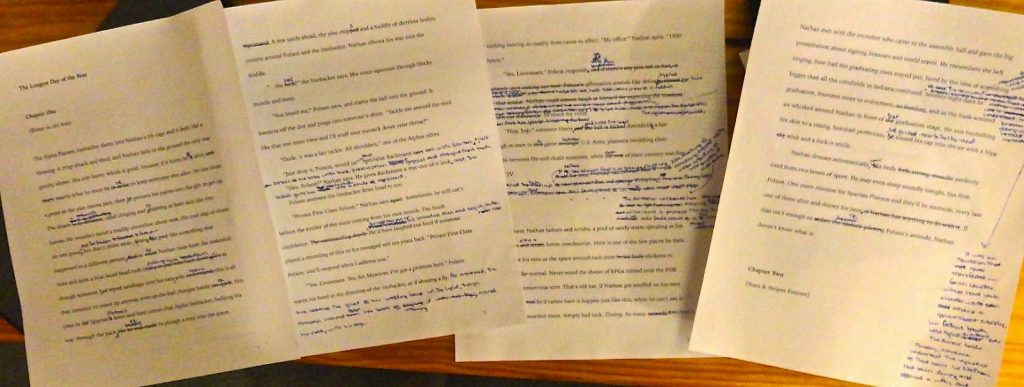Revising the Novel: Thoughts on Characterization
After stalling for about a month, trying to come at painstaking chapters from various different mental states and stages of creativity, I’ve come to the realization that–while I can (and have been) forcing my way through the final third of the novel in its fourth revision, my heart isnt’ in it because I know things about my characters that can no longer be ignored. Their changes aren’t manifesting clearly enough in the final third, and in order to do what I want to do there, I need to fix what comes before.
I’ve always charged ahead. Always said I wouldn’t obsess and nit-pick to the point of stalling. But working my best angles and trying everything I knew how to do yielded less-than-impressive results in January and February. I wrote about it in my journal. I talked it out with another writer. I pondered and pondered. I even moped. Finally, I accepted that to forgo these revisions of the final third of the novel is not to fail, rather, it’s to free myself from writing that I understand will not be true to character anyway.
With that in mind, I sat down in my reading chair, took out my trusty paper and pen, and reviewed some of my favorite quotes from Jeff Vandermeer’s astonishing book, Wonderbook. I felt immediately empowered. The work that came in the next few hours was very slow, very meticulous. If someone had been watching me, they might have thought I was simply staring off into space, scribbling just a few lines every ten minutes or so. But there’s a reason for this tempo–and it has to do with characterization.
With each line of dialogue, each reaction to setting, each chosen scene–we’re characterizing our characters whether we want to or not. Each choice must be exactly right for that character at that time. Each sentence must reflect the proper worldview, and of course, that worldview must evolve and change as the emotional beats of a novel build to a breaking point. Given this, I journaled about the following questions:
- How does Nathan (my protagonist) express his desires?
- How does Nathan feel when those desires are thwarted?
- What makes Nathan feel relief or happiness?
- What were Nathan’s defining moments as a young man? As a soldier?
- What is Nathan’s greatest fear?
- What circumstances surrounded the beginning of Nathan’s relationship with Tenley? When was the high point of that relationship? When did this relationship experience its first moment of real risk?
- What setbacks does Nathan face with regard to his desires?
- What does Nathan have to lose and why?
- How far will Nathan ignore the truth of his situation before something gives?
- Is there anyone in the novel who knows something private/secretive about Nathan and can wield that power over him?
- At its core, what is this novel most essentially about?
I found that, with some careful thinking, I was able to answer each and every one of these questions. Most importantly, I believed in those answers. When I came across an answer I didn’t believe (or didn’t think had manifest in the novel yet), I asked myself why. Then I asked myself how I could fix that, or whether that answer was really the one I should be aiming for in the first place. Finally, I came to the answer to my last question, which I call “the essential sentence”:
This novel is about a man’s desire to be understood, despite the fact that he can do everything right and still be wrong.
Exhaling for what felt like the firs time in months, I re-read my notes. In my hand I held two scribbled pages of the key to my character. I felt like I knew him, at least a little bit better. This was all the permission I needed to return to the work again, refreshed. I got up from the chair, printed Chapter One, and sat back down. Revision is never best on the computer. The mind and hand, the heart and ethereal, need space to breathe. I read out loud. I repeated sentences. I made notes, changes, additions, subtractions. I crossed things out. Rewrote them. Read things out loud again. In a few hours, I had revised 7 pages, the entirety of my opening chapter.
Slow and steady…I think I can, I think I can, I think I can…


